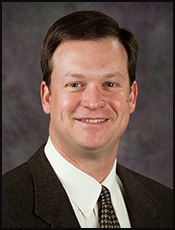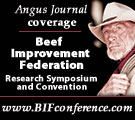![]()

Dan Moser
Dan Moser to Lead AGI
Angus announces new Angus Genetics Inc. president and director of performance programs.
The American Angus Association, the industry’s leader in cattle evaluation services, welcomes Dan Moser as its new president of Angus Genetics Inc. (AGI) and Association director of performance programs.
A unanimous selection of the AGI board of directors, Moser brings more than 15 years of experience in genetic research and education to the Association’s 25,000-plus members and their commercial partners. Read more.

Jay Nordhausen
Association Perspective
Higher prices mean there’s even more potential through transfer papers.
I joined the American Angus Association at the end of May this year to serve as the regional manager for the Nebraska and Colorado territory. I was born and raised in Nebraska. I attended Colby Community College and obtained an associate’s degree in animal science. After my two years in northwest Kansas, I made it back to my home state and attended the University of Nebraska–Lincoln. During my time there, I received an undergraduate and graduate degree in animal science and agricultural leadership. I was blessed to assist the livestock judging team and work with young, talented future agricultural leaders.
In the spring of 2013, I headed back to southwest Nebraska to help on our family operation and take a position with Wright Livestock as a bonded livestock buyer and broker. This endeavor would be the beginning of a very exciting year in the cattle industry. The first big hitch was the lingering effect of the 2012 drought. However, the rains did come in our part of the country, which ignited a 15-month climb of high cattle prices. Read more.
History Lesson in Packing Plant Closures
A K-State livestock economist explains how tight beef supply has caused several U.S. packing plants to turn off the lights and the economic impacts of these closures.
March 2008, Emporia, Kan.: A Tyson beef plant ceased a majority of its beef processing operations. February 2013, Plainview, Texas: Cargill stopped processing beef at one of its facilities. April 2014, Brawley, Calif.: A beef packing plant operated by the National Beef Packing Co. closed its doors. In just the past two weeks, closing announcements of another Cargill packing plant in Milwaukee, Wis., and L&H Packing Co. in San Antonio, Texas, have come to light.
These few examples of closures in the last six years reflect a trend in the United States that has gone on for more than a decade, according to Glynn Tonsor, livestock economist for Kansas State University (K-State) Research and Extension. Read more.
Cattle Producers Discuss Policy Priorities
at Industry Summer Conference
NCBA members addressed policy priorities at the 2014 Cattle Industry Summer Conference in Denver, passing new resolutions and directives for the 2014 Policy Agenda.
“Our policy committees are tasked with a broad spectrum of issues, with everything from environmental regulation to nutrition policy to trade barriers on the agenda,” said Bob McCan, National Cattlemen’s Beef Association (NCBA) president and Victoria, Texas, cattle producer. “Cattle producers gather from across the country to discuss the biggest issues facing the cattle industry right now and make specific decisions on how to move forward on these priorities.”
Along with revisions to current policies, NCBA members analyzed the overall state of the industry in one-on-one discussions with top government representatives, trade officials and other industry leaders. Read more.
Farmland Prices Declining
St. Louis Fed Quarterly Ag Survey shows continued decline in Midwest, Mid-South farmland prices.
Amid excellent crop growing conditions and lower grain prices, farmland values in the Midwest and Mid-South continued to decline during the second quarter of 2014, according to the latest Agricultural Finance Monitor published by the Federal Reserve Bank of St. Louis. The survey for the report was conducted from June 16 through June 30, 2014. The results were based on the responses of 45 agricultural banks located within the boundaries of the Eighth Federal Reserve District.
The eighth district comprises all or parts of the following seven Midwest and Mid-South States: Arkansas, Illinois, Indiana, Kentucky, Mississippi, Missouri and Tennessee. Read more.
What’s Inside …
In this August edition of the Angus Beef Bulletin EXTRA, you'll find valuable articles devoted to the management, marketing, and health and nutrition of your beef enterprise. Select from the tabs at the top of the page to access this month's entire offering by category. A few select features include:
- Pleasant, Practical Processing
- Beef Talk: Recordkeeping
- Characterizing BRD Sickness Response
- The Complication of Shrink
- Feedlot Profitability
- Checkoff Return on Investment
- Positive Market Outlook
News Briefs …
The American Angus Association and its subsidiaries generate a wealth of information to keep members and affiliates informed of what's happening within the industry as well as with the programs and services they offer. Click here for easy access to the newsrooms of the American Angus Association and Certified Angus Beef LLC and the Angus Journal Daily archive recently made available in the API Virtual Library.
Lenders Expect Farm Financial
Performance to Moderate in 2014
Strong financial positions and smart risk-management practices will help farmers face upcoming challenges. Farm Bill expected to have neutral impact on performance.
A recent poll of chief credit officers for Farm Credit lenders in America’s heartland found that after years of exceptional growth, farm financial performance is expected to decline in 2014 as commodity prices moderate from recent record highs.
Saint Paul-based AgriBank conducted the poll in July among chief credit officers for the bank and its 17 affiliated Farm Credit Associations, which provide agricultural loans in a 15-state area stretching from Wyoming to Ohio and Minnesota to Arkansas. Farm Credit is the top source of loans for agricultural and rural borrowers in these states. Read more.
![]()
Informal Child Care
Significantly Impacts Rural Economies
Policymakers can help economy by facilitating increased access to child care in rural areas.
The child-care industry has grown significantly in recent years, contributing considerably to the national economy through job creation and increased opportunities for parents to work. However, little knowledge exists of the size and economic impact of child care, especially informal child care, on rural economies. Now, University of Missouri (MU) researchers have studied the child-care sector in Kansas, particularly in rural areas, and have found that informal child-care services create a large economic impact in the state. Read more.
[Click here to go to the top of the page.]





